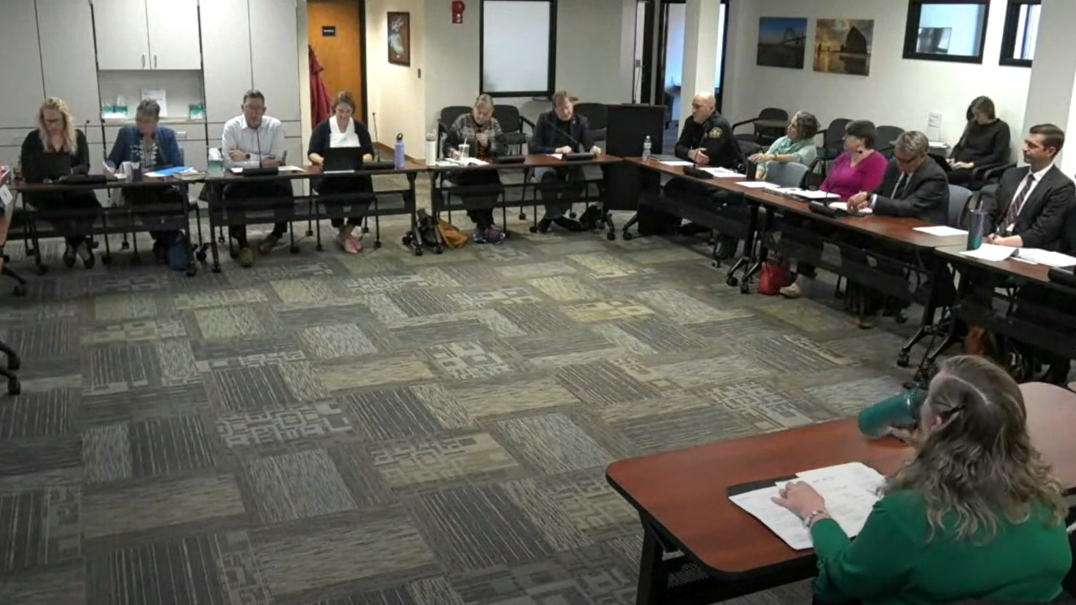
Dec 21, 2023 | AOC Advocacy, Governance, Revenue, & Economic Development
The biennial Court Facilities Task Force, a collaboration between AOC and the Oregon Judicial Department (OJD) to evaluate and prioritize courthouse improvements and replacements, kicks off in January. Funding requests for projects recommended by the task force will be included in OJD’s 2025 legislative budget proposal, which must be submitted by April 2024.
County officials, commissioners, judges, or chairs representing counties that may want help with courthouse projects in the next few years are strongly encouraged to participate in the task force process. AOC is also actively seeking volunteers to serve as members of the task force. Please reach out to mburdick@oregoncounties.org if you are interested in serving.
A kickoff meeting will be held on Tuesday, Jan. 2. OJD staff will provide background information about the task force, review the status of projects that were prioritized last cycle, and answer your questions.
AOC-OJD Court Facility Task Force Kickoff Meeting
Tuesday, Jan. 2, 2024, 10 a.m. to 2 p.m.
AOC Hood Conference Room (2nd Floor)
1212 Court St NE, Salem Oregon
Or attend virtually: https://meet.google.com/hhj-yfbd-dtr
Or dial: (US) +1 209-862-8182 PIN: 891 906 660#
Two additional task force meetings are planned:
- Thursday, Feb. 1, 10 a.m. to 2 p.m. | Task force reviews county presentations summarizing their proposals, and counties get help identifying any missing information
- Wednesday, March 13, 10 a.m. to 2 p.m. | Final deliberation and prioritization
Counties are understood to be responsible for providing “suitable and sufficient” space for the state circuit court system to operate, as well as maintaining the space and providing security, per ORS 1.185. However, providing space to the state circuit court system is tremendously expensive, and most counties face major challenges upholding their responsibility to keep these buildings in safe conditions, as well as addressing the circuit courts’ growing need for space as populations increase. Many court buildings have historic importance, and their preservation and upkeep are especially expensive. As seismic risk has become better understood and standards have been updated, improvement needs and costs have ballooned even higher.
After the state pre-empted local control over county property tax revenue in the 1990s and strictly limited it via Measure 5 and Measure 50, it has become increasingly impossible for most counties to maintain service levels across all sorts of programs, and court buildings throughout Oregon have become increasingly problematic. The Oregon State Bar highlighted the deteriorating condition of Oregon’s courthouses in a 2006 report, and since then the state legislature has developed some mechanisms to address counties’ challenges with these costs. Grants and matching funds are typically provided every biennium, when the legislature meets in its “long session.” But the needs far outstrip the amount of funding available each session. The task force represents a partnership between OJD and AOC to try to focus limited available state assistance funds on projects that have the most critical need.
The task force began in 2014, when Chief Justice Thomas Balmer asked AOC to conduct outreach to counties and find out about their courthouse improvement and replacement needs, review those requests, and provide him with recommendations about which projects should be prioritized for funding from the legislature. In response, AOC established the Court Facilities Task Force in partnership with OJD, and the partnership has persisted ever since. The process helps prevent counties from lobbying against one another for the same money, so it helps counties work together toward a common purpose.
Some might wonder why providing space to the state’s court system is the responsibility of counties. The arrangement is a vestige of times long past. Before Oregon became a state, counties managed a multitude of functions, including judicial ones, which the state later took over. Benton County built a courthouse in 1854, five years before statehood. Oregon’s judicial system has seen many reforms since then; the last major reforms were enacted in 1981. Until a more thorough solution is available, AOC will continue working with OJD to help the legislature understand the state circuit court’s unmet needs when it comes to safe, suitable buildings, and help counties in their efforts to get those needs met.
Contributed by: Michael Burdick | AOC legislative affairs manager

Dec 19, 2023 | AOC Advocacy, Health & Human Services, Legislative Committee, Public Safety & Veterans
The short 35-day 2024 legislative session is expected to focus primarily on housing and Measure 110. AOC recognizes that some proposals under consideration related to Measure 110 reforms will have direct impacts on counties, and consequently our members are deeply invested in the potential outcomes. AOC is committed to elevating the county voice in these discussions and ensuring that AOC members are able to review and weigh in on concepts with direct county impacts.
In preparation for those conversations, AOC steering committees and the Legislative Committee took action at their October meetings.
AOC’s Public Safety steering committee adopted a 2024 legislative priority related to Measure 110:
- Elevate the county voice in Measure 110 reform, supporting policy modifications that prioritize engagement in substance abuse treatment, provide sufficient funding for county services, and strengthen tools the criminal justice system can use to fight illegal drug use and sales.
AOC’s Health and Human Services steering committee also adopted this principle:
- Support Measure 110 reforms to create a sustainable complete continuum of substance use disorder prevention, treatment and recovery capacity that matches community need and is subject to the statutory planning and oversight of local mental health authorities.
Joint AOC Health and Human Services and Public Safety Steering Committee Meetings
AOC leadership recognizes the importance of the Measure 110 reform conversations to our members, and in collaboratively evaluating both the health and public safety policy considerations. Accordingly, during the 2024 legislative session, AOC’s Health and Human Services and Public Safety steering committees will be meeting jointly to determine AOC positions on relevant 2024 legislative bills. The four co-chairs of these two committees will also meet together routinely to collaborate and direct staff.
On Oct. 27, AOC held a joint Health and Human Services and Public Safety steering committee meeting focused on Ballot Measure 110. The meeting, with over 90 individuals participating in person and virtually, focused on current data, local government perspectives and potential policy changes in the coming year. A variety of partner groups and advocates joined the meeting to share their experiences and thoughts on the future of Measure 110. A full recording of the meeting is linked here.
In the Capitol
Oregon’s legislative leadership created a new joint committee to consider Measure 110-related changes for the 2024 legislative session. The Joint Interim Committee on Addiction and Community Safety Response is co-chaired by Senator Kate Lieber and Representative Jason Kropf. The committee has now met three times. At its October meeting, the committee focused on behavioral health and addiction services. At its November meeting, the committee heard from the law enforcement community on potential policies. A coalition of public safety stakeholders shared with the committee an 11-point proposal.
At its December meeting, the joint committee heard from experts on: evidence-based substance use disorder treatment; medication assisted treatment; and deflection, stabilization and alternative intervention programs. At this 4-hour long meeting, the committee also heard public testimony for the first time. Invited to provide testimony, AOC staff shared with the committee AOC’s adopted priorities and principles on Measure 110 reform, encouraging the committee to consider holistic changes with appropriate systematic funding for county services. AOC further advocated for counties to continue to be invited to the table and included in reform discussions to ensure counties can partner successfully with the state on any future changes. You can watch a full recording of the hearing here.
We expect the next meeting of the joint committee to take place during January Legislative Days.
AOC is actively engaged with legislative leaders and local system partners to discuss the ramifications of potential policy decisions, ensuring that any potential policy change is examined for county impact.
Want to join the conversation?
AOC members interested in shaping the organization’s positions on 2024 legislation affecting Oregon counties are encouraged to participate in January and February steering committees. The schedule can be found on our website.
Contributed by: Jen Lewis-Goff and Jessica Pratt | legislative affairs managers

Oct 31, 2023 | AOC Advocacy
On Oct. 12, 2023, three people who lost their homes to foreclosure over unpaid property taxes filed a lawsuit against the counties that foreclosed on them in the U.S. District Court for the District of Oregon. The lawsuit demands refunds of any proceeds of foreclosure sales that exceeded plaintiffs’ debts to Lane, Multnomah, and Yamhill counties, and pertains to sales that took place as far back as May 25, 2017. It seeks to be recognized as a class action on behalf of all similarly situated former homeowners. Counties have been anticipating lawsuits like this one ever since news broke of the U.S. Supreme Court decision, Tyler v. Hennepin County.
On May 25, 2023, the high court ruled that a 94-year-old woman should have received a refund from Hennepin County, Minnesota after they foreclosed on her condo over $17,300 in unpaid property tax, interest, and penalties, and sold it for $40,000. Minnesota is among 14 states, including Oregon, where the foreclosure process provides for the delinquent property being forfeited in its entirety. Under Oregon law, counties retained the proceeds of foreclosure sales, even if the proceeds exceed the taxes, interest, and penalties that were owed. The State of Oregon had filed a “friend of the court” brief in the case, defending Hennepin County against the suit. The ruling held that such processes violate the Takings Clause of the Fifth Amendment to the U.S. Constitution.
AOC expects that soon every county in Oregon will be targeted by similar lawsuits over foreclosure sales, including sales that may have taken place many years ago. Preliminary discussions with CIS, who provides insurance to most Oregon counties, indicate that none of these losses are likely to be covered by insurance. Considering how tight county budgets are, fears are growing over how counties can possibly afford obligations associated with the lawsuits without making catastrophic cuts to critical services such as libraries, policing, and public health programs, or even going bankrupt. AOC is working with counties now to develop an estimate of county legal liability statewide, and are seeking state funding to assist counties with these costs.
Counties in many other states have already seen similar lawsuits. Last year, Oakland County, Michigan settled a similar case for $38 million, and this spring, forty-three other Michigan counties agreed to settle a similar lawsuit, in an agreement estimated to cost tens of millions of dollars.
Getting state help with these costs was identified by AOC membership as our top priority for the 2024 legislative session in the governance and revenue portfolio, along with limiting liability around future foreclosure sales surpluses and establishing new statewide guidelines for how to handle foreclosures. Most states have laws setting reasonable time limits for filing a claim over foreclosure surpluses, which helps counties avoid surprise claims impacting already-budgeted funds – Oregon does not.
There are some steps counties can take by themselves to limit liability associated with future foreclosure sales, but for every one of Oregon’s 36 counties to develop and enact their own ordinance will be a costly exercise, and having a patchwork of varying approaches across Oregon doesn’t make any sense.
At their September meeting, the AOC Governance and Revenue Steering Committee convened a workgroup to develop a legislative proposal for 2024 that addresses these issues. A group of about a dozen county staff who have legal or property management expertise met on Sept. 18, with Marion County Assistant Legal Counsel Scott Norris leading the group in efforts to craft a draft proposal. AOC is working hard to secure introduction of the proposal as a bill for consideration in the 2024 legislative session.
Contributed by: Michael Burdick | AOC legislative affairs manager

Oct 24, 2023 | AOC Advocacy, Public Safety & Veterans
Many Oregon counties are currently facing a funding shortage for community corrections, reflective of state budgetary allocations not meeting current needs. At its October meeting, the Association of Oregon Counties (AOC) Public Safety Steering Committee adopted a 2024 legislative priority advocating for additional one-time funds ($16 million) for community corrections for the remainder of the biennium. These funds are critical to assist counties in maintaining current service levels until a larger conversation and effort can be taken to review and adjust the overall community corrections funding formula.
In 1995, the Oregon State Legislature passed Senate Bill 1145, establishing community corrections as a state-county partnership to provide supervision and services to certain offender populations. Through the partnership with the state, counties are reimbursed for individuals in their custody sentenced to 12 or fewer months of incarceration, and individuals on probation, parole, or post-prison supervision. The reimbursement rate to counties is based on a complex formula that considers among other factors: populations, case load forecasting, and risk assessments. A cost study is conducted every six years to inform the reimbursement rate. The latest cost study was conducted in 2018.
Oregon legislators received briefings on this issue in the House and Senate Judiciary Committees, as well as in the Joint Ways and Means Public Safety Subcommittee during September legislative days. The Oregon Association of Community Corrections Directors (OACCD) educated lawmakers on the shifting populations being served by community corrections due to a variety of factors such as the COVID-19 pandemic, a public defender shortage, and Ballot Measure 110. The presentation also shared concerns that the funding formula was based largely on a point-in-time cost study, without considering inflation or population risk level costs above average. OACCD discussed funding challenges over the last few budget cycles based on this formula. Washington and Lane counties presented firsthand accounts on how the capacity required to serve the community corrections population continues to become increasingly more complex.
Rep. Kropf, House Judiciary Committee Chair, gave legislative blessings for a Department of Corrections facilitated workgroup to begin stakeholder discussions on the current community corrections funding formula with an eye toward the 2025 legislative budget. AOC was allocated three seats on this committee: one staff member and two commissioners. President DeGroot appointed AOC Public Safety Steering Committee Co-chairs, Commissioner Dave Henslee (Klamath) and Commissioner Jeremy Gordon (Polk) to represent AOC on this workgroup. The county perspective will also be shared via workgroup seats allocated to the OACCD.
“Community corrections is a key public safety tool in our communities,” says Commissioner Gordon. “We urge the Oregon Legislature to allocate additional one-time funds to county community corrections for the remainder of this biennium.”
“Looking ahead to future biennia, our steering committee looks forward to thoughtfully collaborating with our community corrections directors, the Oregon Department of Corrections, Oregon legislators, and other partners, as we dive into this complicated formula discussion,” adds Commissioner Henslee.
Contributed by: Jen Lewis-Goff | AOC Legislative Affairs Manager

Oct 24, 2023 | AOC Advocacy, Transportation
The Association of Oregon Counties (AOC) and League of Oregon Cities (LOC) continued the virtual forum series to coordinate, collaborate, and cultivate a shared understanding of local government interests in Oregon’s transportation funding system.
In August, the first forum meeting provided a detailed overview of federal, state, and local funding mechanisms and how these revenue tools work together to fund the current system. Presentations from the Oregon Department of Transportation, AOC County Road Program, and LOC reviewed the current system, with an emphasis on structural deficits and declining fuel tax revenues. A recording is available here.
The second forum meeting, held on Monday, Oct. 2, featured presentations from two city and two county road departments that demonstrated the range of local jurisdiction transportation budgets and varied regional project priorities. A productive brainstorm and strategy discussion followed the presentations. Slides are available here and a recording of the meeting can be found on the League of Oregon Cities YouTube page.
Forum meetings will continue next year to identify priorities and develop guiding principles to inform AOC and LOC engagement in an expected transportation funding package during the 2025 legislative session. Forum conversations will seek to increase transparent, partnership-oriented communication with state agencies, commissions, and the legislature related to transportation funding policy.
Future forum meetings will feature insight from national experts, and an exploration of mechanisms such as congestion pricing and tolling, road usage or vehicle miles traveled fees, and local options.
Contributed by: Mallorie Roberts | AOC Legislative Affairs Director

Oct 24, 2023 | AOC Advocacy, Health & Human Services
Oregon’s homelessness and fentanyl emergencies demand immediate fixes to problems decades in the making. Discussions in the state legislature and at the Association of Oregon Counties (AOC) seek policy solutions for meaningful progress in the 2024 short legislative session and beyond.
The Joint Interim Committee on Addiction and Community Safety Response was announced by legislative leadership in September in response to widespread dissatisfaction with the implementation and impact of Ballot Measure 110. The committee, led by Senate Majority Leader Kate Lieber and House Judiciary Committee Chair Jason Kropf, met for the first time on Oct. 18 and focused on the “demand” side of Oregon’s addiction crisis.
State and national experts provided testimony on substance use trends, prevention and treatment science, and what Oregon’s addiction response system needs to turn the tide. Researcher and clinician Dr. Kimberly Sue presented her findings and recommendations for designing nimble treatment systems for the fentanyl era. Her testimony, along with that of crisis service providers from across the state, underscored the need for immediate response capacity (modeled after police, fire and ambulance response) and smooth transitions for individuals moving through the continuum of care program, from peer-led outreach and harm reduction to detox and crisis stabilization, treatment, supported housing, and recovery services.
Witnesses cited eliminating the excessive administrative burden on existing providers and the red tape that is slowing or preventing the development of new workforce and new treatment facilities as opportunities for immediate improvement to addiction response in Oregon.
Testimony was also given on the efficacy of adequately funded local and statewide prevention initiatives and the lack of proper investment in every level of addiction prevention and response, most acutely in prevention and services for youth. The next committee meeting, on Nov. 6, during regularly scheduled “legislative days,” will focus on the “supply” side of the addiction crisis and public safety interventions.
AOC health and human services’ priorities for the 2024 short legislative session address discrete but key steps to create the responsive, coordinated public safety and health systems required to foster safe livable public spaces and healthy communities. AOC’s first priority is to establish a reliable process and schedule for the state to assess the cost of providing the core mental health and addiction services that counties are statutorily required to provide. Currently, Oregon Health Authority lead staff members do not have cost estimates for these services, and thus are unable to craft an agency recommended budget to match current or projected need.
AOC’s second priority for the 2024 session, a continuation of our 2023 priority, is to mitigate the liability risk shift to counties and their local providers for services to court-mandated populations, such as those persons ordered to community aid and assist restoration services. In the last few years, Oregon has sincerely begun to transition from an institution-based system to a community-based system to serve individuals in court-mandated behavioral health treatment. However, the system is not currently equipped to provide these services without an adequate investment in community service capacity or liability protection for counties and providers who serve a rising number of people, some with more acute and complex medical and mental health needs.
On Oct. 27, AOC will hold a joint meeting of its public safety and health and human services steering committees to prepare for expected efforts to fix Measure 110 in the 2024 session. AOC staff will field reports from public safety and community mental health program partners on current impacts of Measure 110, hear from the proponents of reform proposals currently in the public domain, and listen to member discussion of policy positions that will give Oregon counties the authority and tools they need to be healthy, vibrant, and safe.
AOC has also embarked on a longer-term health and human services summit series which kicked off on Oct. 2, with a dual purpose of elevating and propagating local solutions across the state and preparing counties to offer statewide solutions in the 2025 legislative session and beyond. The next meeting in this ongoing series will be Friday, Nov. 3, from 1 to 4 p.m.
Make sure to attend these educational sessions coming up at the AOC Annual Conference in Eugene, on Nov. 15:
- The Opioid Crisis and the Untapped Potential of Local Public Health Response and Prevention
- The 60th Anniversary of the Community Mental Health Act – Have We Realized the Vision?
- Oregon’s Local Homelessness Response Experiment: Preliminary Findings and Progress
Contributed by: Jessica Pratt | AOC Legislative Affairs Manager






